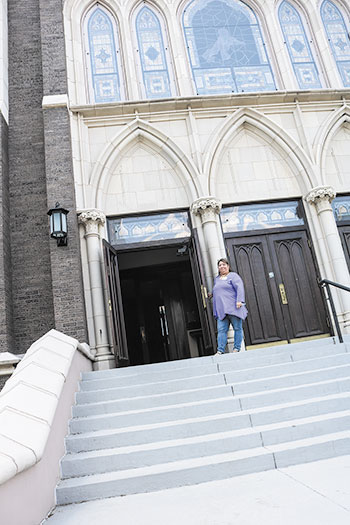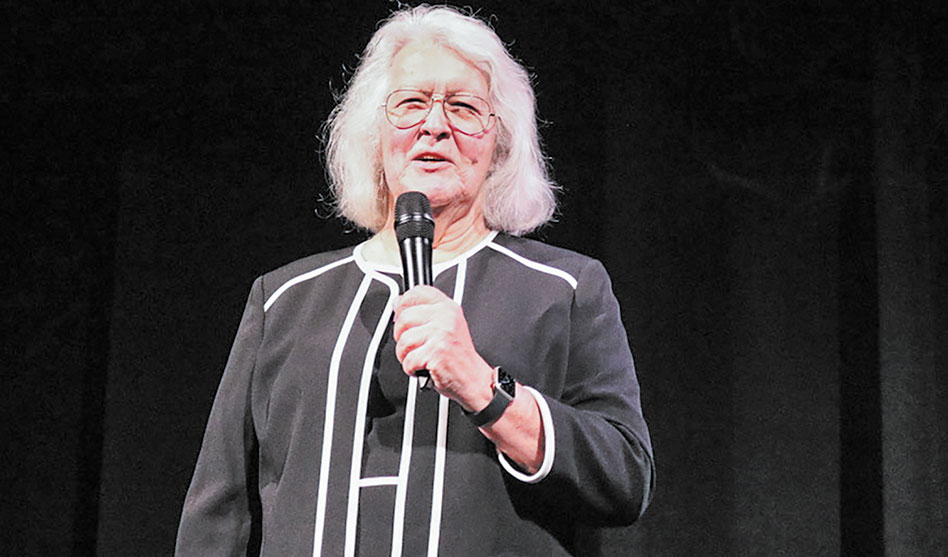The Hon. Phyllis Frye spoke at the Dallas Holocaust and Human Rights Museum for Trans Awareness Week. (David Taffet/Dallas Voice)
22 victims will be remembered in annual Transgender Remembrance Day events
DAVID TAFFET | Senior Staff Writer
taffet@dallasvoice.com
On Transgender Day of Remembrance, 22 names will be added to a growing list of victims of deadly anti-trans violence in the U.S. Around the world, 320 trans people have been murdered so far this year. Those numbers, while horrifying, don’t set a record in a year that has seen a dramatic increase in hate crimes in all categories.
In 2022, 32 trans people were killed in the U.S. and 327 around the world. The statistical year runs from October through September. Deaths that occur this month will be counted in 2024.
Since statistics have been gathered, 4,600 trans and gender non-conforming people have been murdered. The actual numbers are probably higher since so many hate crimes go unreported and because trans victims are often misgendered after their deaths.
This year, TDoR will be commemorated in Dallas with smaller events than in past years but spread out across the area.
Pam Curry, who organized the first TDoR event in Dallas, said liberal churches across the area are incorporating remembrances of trans victims of hate into their Sunday worship. She said that includes at least three Dallas County churches — Northaven, Oak Lawn and St. Stephens UMCs.
Cathedral of Hope UCC “will be honoring our trans community during the service on Sunday with special liturgy,” according to church spokesman Scott Stout.

Oak Lawn United Methodist Church will incorporate TDoR into its regular Sunday service.s
On college campuses across the area, small gatherings will mark the day. The UT Dallas Gender Center will hold a vigil. And Trust the Process Project, Nu Trans Movement and Trans Empowerment Coalition will conduct a panel discussion in the library at Dallas College — Cedar Valley campus at 12:30 p.m. on Monday, Nov. 20. That discussion will be streamed online.
Trans Empowerment Coalition is hosting a week of programming. The opening event takes place on Sunday, Nov. 19, at 6 p.m. at Owenwood Farm & Neighbor Space, 1451 John West Road in East Dallas. Equality Texas, House of Rebirth and others are co-sponsors.
The Dallas Holocaust and Human Rights Museum marked Transgender Week of Awareness, the week leading up to TDoR, by bringing in Houston Judge Phyllis Frye, the first transgender judge in the U.S. In 1980, Frye got the Houston City Council to repeal an ordinance banning crossdressing after years of lobbying, and she was the first out transgender person to lobby for rights at the Texas Legislature.
Frye spoke about her discharge from the army, the engineering degree she was never able to use because of discrimination and her “accidental” law degree. A&M was offering a combined business and law degree, and while she enrolled for the business degree, she found she excelled in law, she explained.
She opened her own practice and was the first attorney in Texas to convince a judge to not only do a name change for a transgender client but also a gender marker change. And in 2010, Mayor Annise Parker named Frye a municipal court judge, making her the first trans judge in the U.S. and probably the world.
Frye said in an earlier interview that it wasn’t until the internet came along that transgender people could find each other and begin to organize. Unlike the gay and lesbian communities, there weren’t bars, and most cities still didn’t have community centers, she said.
In a chat group on America On Line, Frye and others learned of the stabbing death of trans woman Rita Hester in Massachusetts; they compared that case to a similar murder, that of Chanelle Pickett, the previous year. Most in the chat room hadn’t heard of Pickett.
Gwendolyn Ann Smith, a reporter for the Bay Area Reporter, started a website called Remembering Our Dead in 1999. That was the year the film Boys Don’t Cry was released, which brought awareness to the problem of anti-trans violence. The web project grew as they tracked violence against the trans community around the world and became Transgender Day of Remembrance.
Curry noted that while some TDoR commemorations include those lost to suicide, TDOR “was never about suicides. That’s suicide awareness. TDoR iss about violence perpetrated by hate.”
She continued: “TDoR memorializes the straight guy, perceived to be a freak because he held his wife’s bag while she tried on clothes and helped an elderly man to the restroom, who was shot dead in a department store” in 2002. Then there was “the trans woman stabbed, shot multiple times and burned on a pile of tires.”
And then there was Muhlaysia Booker, who was assaulted in an apartment complex parking lot in 2019, then murdered a month later by a different attacker. A video of the parking lot assault went viral, so when she was shot three times and her body dumped in the middle of the street in East Dallas, the murder got national attention. The body of a second trans woman, Chynal Lindsey, was found floating in White Rock Lake on June 1.
The two murders turned out to be unrelated, with just one thing in common — the belief no one cared about these women.
In 2021, Ruben Alvarado was convicted of first degree murder for killing Lindsey and sentenced to 37 years in prison. And Booker’s murderer, Kendrell Lyles, was finally convicted just last week, four years after the murder, receiving a 48-year sentence. The murders of numerous other trans women in DFW, however, remain unsolved.

